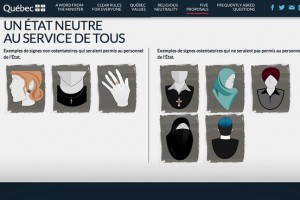SECULARISM RULES — This is the Quebec provincial government website showing what kinds of religious garb would be banned (right) for government workers and what kind accepted (left).
The government of Quebec has unveiled legislation to ban religious clothing from the government workforce. The measure was widely seen as yet another example of Islamophobia in the West, but also as part of a ploy by the Quebec government to push for the province’s independence from Canada.
By creating a fight with the federal government over the legislation, it is believed the separatists who now rule in Quebec are trying to build support for independence by arguing that the federal government pushes Quebec around and will not allow it to pursue its own culture. The argument is similar in philosophy to that used in the Islamic Republic to mobilize the public against the West.
The Quebec legislation is not exclusively anti-Islamic. That was its origin, however. It evolved from the French campaign against overt Islamic practices and the French law passed in 2010 that forbids full-face veils like the burqa and niqab, but not headscarves.
The Quebec law is much broader in what religions it offends, but much narrower in that it applies chiefly to people employed by the government of Quebec. It would bar civil servants from wearing the Jewish yarmulke or skullcap, the Sikh turban, large (but not small) Christian crosses used as jewelry, the burqa and the headscarf.
The legislation will also allow small businesses the right to push back on religious demands, such as prayer time. It wasn’t immediately clear if the law would allow private employers to extend the ban on headscarves, yarmulkes, et cetera, to their workplaces.
Beyond public employees, the legislation requires people receiving state services—that is, anyone who walks into a government office—”to make their faces completely visible,” a measure aimed at banning the burqa, which has drawn very strong opposition across Europe, but not in North American outside Quebec.
Quebec Premier Pauline Marois told a Quebec newspaper that, for her, a day care teacher wearing a headscarf carries a “connotation of a certain gap between the respect of equality between men and women, of a sort of submission.”
The legislation is being pushed by the ruling Parti Quebecois, which has been trying for decades to convince Quebeckers they would be better off if they seceded from Canada. The party has been voted onto power several times, but no referendum on secession has ever passed, though the votes have been close.
The Parti Quebecois government says the draft law treats everyone equally by ending special treatment for the religious at work. It also portrays the law as liberal because it bans the burqa, which the Parti Quebecois (and many liberals in Europe) say discriminates against women.
“We want rights and values that will be the source of harmony and cohesion,” said Bernard Drainville, the Quebec provincial government’s minister for democratic institutions and active citizenship. “That will apply to all Quebecers, regardless of our faith and religion.”
“The best way to respect all Quebecers, the best way to respect all beliefs and all religious, is for the state to have no religion,” Drainville said.
That neutrality does not apply, however, to the crucifix that has adorned the main chamber of the National Assembly since 1936, which will stay up in deference to the province’s “cultural heritage,” he confirmed.
The Parti Quebecois now leads a minority government and will need the support of another party to get the bill through the provincial parliament.
Jason Kenney, the federal immigration minister, said he was “very concerned” by the proposed legislation and said the federal government will challenge any law it deems unconstitutional. But he did not say that the Quebec draft was unconstitutional. Lawyers say the law may infringe constitutional rights on freedom of religion and expression.
According to an opinion poll taken by Leger, 57 percent of Quebecers think the dress code is a good idea, while 28 percent believe it a bad one.
A half-century ago, Quebec shifted quickly from a bulwark of Catholicism to a bastion of secularism. In the 1960s, the so-called Quiet Revolution saw Quebecers break the grip of the Catholic Church on education, health care and many other aspects of life in the province. The process has left Quebec with one of the lowest church attendance rates in Canada.
The proposed legislation has come under fire from public-sector unions.
“If you want to wear a cross on your neck, that’s your business,” said Yves Parenteau, an official at the teachers union, Alliance des Professeures et Professeurs de Montreal. “Just as long as you don’t talk about the crucifixion in class.”
In an increasingly diverse province, many religious groups have also come out against the measures.
“This is painful, it’s an encroachment on freedoms that are guaranteed constitutionally,” said Salam Elmenyawi, the president of the Muslim Council of Montreal.
The bill’s critics say it lets off many Christian traditions, allowing, for instance, Christmas trees in public spaces.
In the last decade in Europe, school pupils have been banned from wearing headscarves and other traditional religious dress in several countries, including Spain, France, Belgium, Switzerland and the Netherlands, according to a 2012 report from Amnesty International.
